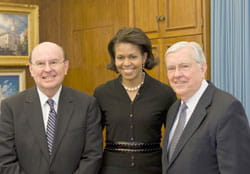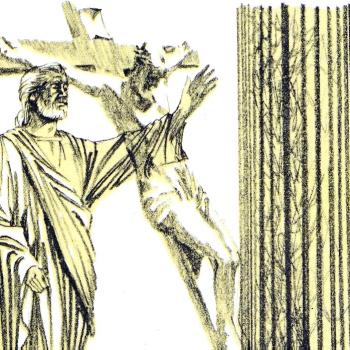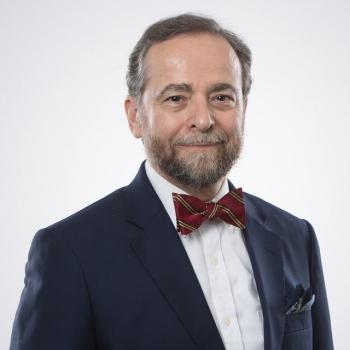
 |
| Quentin L. Cook, left, and M. Russell Ballard, right, both members of the Quorum of Twelve Apostles, pose with Michelle Obama who met with the two LDS Church leaders during her visit to Salt Lake City on Feb. 4, 2008. Cook recently wrote a one-of-a-kind online essay on the website, patheos.com, a 2-year-old project to provide fair and balanced information about all faiths. (Photo courtesy of The Church of Jesus Christ of Latter-day Saints) |
By Peggy Fletcher Stack
The Salt Lake Tribune
Updated Aug 20, 2010 07:36PM
As in the past, the LDS Church does not plan to join in ecumenical dialogue but will continue to work with like-minded faiths on humanitarian projects and in defense of religious liberty, Mormon apostle Quentin L. Cook wrote recently in a one-of-a-kind online essay.
Cook did not get the final word, nor the only word, on the future of the Utah-based Church of Jesus Christ of Latter-day Saints.
The apostle was joined by bloggers, academics, writers and scholars who discussed everything from race relations and women's issues to publishing, public affairs and technology - from scripture studies to sociology and marketing to missionary work.
The 20 individual essays were gathered by and published on the website patheos.com, a 2-year-old project to provide fair and balanced information about all faiths, with special emphasis on Buddhists, Catholics, evangelicals, Hindus, mainline Protestants, Jews, Muslims, Pagans - and Mormons.
"We want it to be the WebMD of religion and spirituality," said Leo Brunnick, who launched the site with his wife, Cathie, the same week they were married.
He and his wife were web-tech experts who had lived in many places among various believers. She was reared Lutheran but now is evangelical; he was an Irish Catholic from Boston but not practicing. They had hundreds of questions as they tried to blend their families but no place to start.
So they assembled a "religion library," offering the work of some 200 scholars, and also produced hundreds of essays about various faiths.
"We stand in the triangle between academia, traditional media and faith sites," Brunnick said in a phone interview from his Denver headquarters. "We try to combine the best of those things - to be credible like academia, consumable like the media and passionate like the faith sites."
One of the first people Brunnick hired was David Charles, an Oxford- and Harvard-trained religious-studies scholar who happened to be a Mormon.
Charles spent most of his formative years in Switzerland, served an LDS mission to Frankfurt, Germany, did a semester at Brigham Young University's Jerusalem Center, earned a bachelor's degree from BYU in comparative literature and lived in Jordan with his wife as newlyweds.
"I had a longstanding passion for the study of different religions and cultures," Charles said. "I immediately sensed [patheos] was something I wanted to be part of, and was something that was a good fit for my background, interests, training and personality."
Charles was hired as the site's content director in September 2008, and, he said, "it's been a wild ride ever since."
Last year, Brunnick and Charles met with two members of the LDS First Quorum of the Seventy and some Mormon public-affairs personnel to describe their work. The LDS representatives could see, Brunnick said, the value of having a "great platform for a fair and positive Mormon voice without having any association with the church."
Patheos decided this summer to explore the future of various faiths as well as religion itself. The editors invited prominent, thoughtful commentators to discuss what they viewed as major trends, challenges and opportunities facing their particular traditions. The group posted about the future of Hinduism in June and then moved to a new faith each week or so.
When it came time to look at the future of Mormonism, the meeting with LDS authorities paid off. Cook agreed to write one of the essays, which could be a first for a Mormon apostle.
The other LDS essays were initiated by Ben Spackman, who oversees the Mormon "portal" - or area.
8/20/2010 4:00:00 AM














